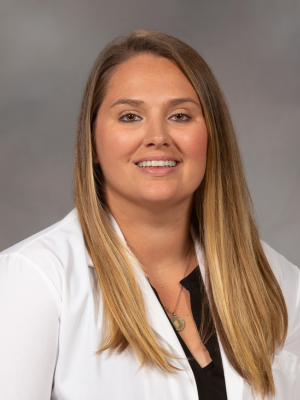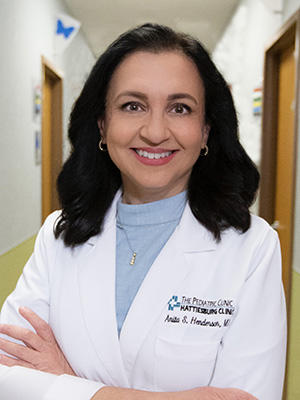Rising COVID-19 cases signal need for caution

The number of COVID-19 hospitalizations is on the rise in Mississippi and nationwide, prompting infectious disease experts from the University of Mississippi Medical Center to encourage taking precautions to limit the spread of the virus as well as influenza and RSV.
Nationally, COVID-19 hospitalizations over the past week numbered 18,871, an increase of 8.7% over the previous week, according to the U.S. Centers for Disease Control and Prevention.
In Mississippi, 1,883 COVID-19-like illnesses in the week ending Aug. 26, and 134 new COVID-19-related hospital admissions were reported to the CDC in the week ending Sept. 2. Though that’s an increase of more than 32% over the 101 admissions reported Aug. 5, it’s far less than the 1,360 COVID-19 related hospitalizations recorded Jan. 22, 2022, during the Omicron surge. The national figure for COVID-19 hospitalizations at that time was about 150,000.

“The CDC’s COVID-19 data tracker for Mississippi shows an uptick in COVID-19 circulation in the community, and other viruses are circulating, too,” said Dr. Bhagyashri Navalkele, medical director for infection prevention at UMMC. “With the rise in viral infections, choosing to take precautions such as practicing good hand hygiene and getting vaccinated against COVID-19 will protect you as well as our high-risk patient population.”
COVID-19 vaccines that have been updated to fight current variants are expected to be available as soon as this month.
Respiratory syncytial virus, or RSV, can also be dangerous, particularly for young children, even those who had no pre-existing conditions. Most babies who were critically ill with RSV in 2022 were full term and previously healthy, UMMC researchers reported in a study published in the Journal of the American Medical Association.
During the summers of 2022 and 2021, the state’s only children’s hospital, Children’s of Mississippi, saw increases in the number of patients hospitalized with RSV. Spread via respiratory droplets from coughing or sneezing, RSV is among the causes of pneumonia and bronchiolitis in children younger than 1.
The virus leads to about 80,000 hospitalizations with as many as 300 deaths among children younger than 5 each year, U.S. Centers for Disease Control and Prevention statistics show.

RSV is very common, said Dr. Laura Wright-Sexton, assistant professor of pediatric critical care and one of the study’s authors. However, it is difficult to predict which children will become seriously ill from RSV.
“RSV is a major contributor to pediatric illness in the PICU,” she said. “We often see children, 2 years of age and younger, who end up with significant viral pneumonia and respiratory failure, due to the virus. The younger patients tend to have more severe disease and a higher likelihood of requiring intubation, aligning with the study data.”
In the multi-state study, about 81% of the babies critically ill with RSV did not have an underlying medical condition. About 24% of the infants needed intubation for breathing.
This year, parents have a new preventative measure to take against RSV. The U.S. Food and Drug Administration approved Beyfortus, a monoclonal antibody injection for newborns and infants during their first RSV season. Children up to age 2 who have pre-existing conditions such as a congenital heart condition or breathing difficulties can receive another dose during their second RSV season.
"I absolutely recommend the monoclonal antibody for all qualifying children, following the CDC’s new guidelines,” Wright-Sexton said. “It is another tool in our toolbox to help protect the children of Mississippi.”
On Aug. 21, the FDA approved Abrysvo, the first vaccine approved for use in pregnancy to prevent lower respiratory tract disease (LRTD) caused by RSV in infants from birth to 6 months. In May, Abrysvo was approved for prevention of LRTD from RSV in adults 60 and older. RSV results in at least 60,000 hospitalizations of adults 65 and older each year.
The CDC and the American College of Obstetricians and Gynecologists have recommended vaccines for pertussis, influenza and COVID-19 in pregnancy to protect mothers and their babies.
Influenza vaccines for this season are available at clinics and pharmacies around the state for eligible adults and children 6 months and older.
Other ways to keep RSV, COVID-19 and other viruses at bay include washing hands with soap and water, avoiding contact with people who are sick, covering mouths with the inside of the elbow when coughing or sneezing, and not sharing cups or glasses.
Staying home when experiencing symptoms is an effective way of keeping others safe. COVID-19 and influenza share some of the same symptoms, including fever, chills, shortness of breath, fatigue, sore throat, congestion, body aches, headaches and vomiting. Change in or loss of taste or smell can occur in flu, but it is more often a symptom of COVID-19.
RSV symptoms include a runny nose, coughing, sneezing, fever and wheezing as well as a decrease in appetite.

Dr. Anita Henderson, a pediatrician with the Hattiesburg Clinic and past president of the Mississippi chapter of the American Academy of Pediatrics, said the increase in COVID-19 cases coincided with the start of a new school year.
“My advice to parents would be to have your child evaluated for any symptoms including fever, cough and shortness of breath,” she said.
COVID-19 vaccination for young children will lower their risk of COVID-19 and its complications, Henderson said. “There are many babies who have been born in the last year who are not vaccinated and have no immunity to COVID-19. If your child is 6 months or older, we do recommend the COVID-19 vaccine. We hope to have new updated boosters available in the next month, which will help protect against newer variants.”
Adults and children with conditions that put them at elevated risk for complications of viral infections should stay up to date with their boosters, Henderson said. “Children with asthma, diabetes, and other chronic medical conditions should make sure they are up to date on their COVID-19 vaccine and flu vaccine this fall.”
While RSV usually peaks in winter, Henderson encourages families to take precautions now. “We encourage grandparents who are 60 and above to get the RSV vaccine to protect themselves and their grandbabies,” she said. “We are hopeful that the RSV prevention monoclonal antibody Beyfortus will be available soon. It will be an important tool to help protect babies from RSV illnesses and hospitalizations.”


